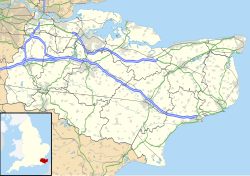Template:Infobox monastery
| This template uses Lua: |
This template is used to present a consistently-formatted table of summary information for use in articles about monasteries, priories and nunneries. Please do not make major changes to this infobox without proposing and discussing it on the talk page first.
Usage
[change source]| Parameters | Brief instructions |
|---|---|
{{Infobox monastery
| name =
| native_name =
| native_name_lang =
| image =
| alt =
| caption =
| full =
| other_names =
| order =
| established =
| disestablished =
| mother =
| dedication =
| diocese =
| churches =
| founder =
| abbot = <!-- or | abbess = -->
| prior = <!-- or | prioress = -->
| archbishop =
| bishop =
| archdeacon =
| people =
| status =
| functional_status =
| heritage_designation =
| designated_date =
| architect =
| style =
| groundbreaking =
| completed_date =
| construction_cost =
| location =
| map_type =
| coordinates =
| oscoor =
| remains =
| public_access =
| website =
| other_info =
}}
|
Monastery name (COMPULSORY)
Name in local language. If more than one, separate using {{plainlist}}
ISO 639-2 code e.g. "fr" for French. If more than one, use {{lang}} instead
Image of the monastery
Alternative text for the image
Caption for the image
Full name or dedication of the monastery
Any alternate names by which the monastery is known
The order of monks or nuns which the monastery housed (COMPULSORY)
Date of establishment (COMPULSORY)
Date of suppression
Name of the mother house
The full name or dedication of the monastery
The diocese to which the monastery belongs or belonged
Churches controlled by the monastery
Name of the founder
Present Abbot or Abbess
Present Prior or Prioress
Present Archbishop
Present Bishop
Present Archdeacon
Important people associated with the monastery
status
functional status
heritage_designation
designated_date
architect
style
groundbreaking
completed_date
construction_cost
Location, given as: village, county, country
Base map type for push pin map
Geographic coordinates using {{coord}}
Grid reference according to the British national grid reference system
What remains are still visible on the site
Whether or not there is public access to the site
Website
Other relevant information
|
- Parameters not marked as compulsory can be safely left blank. Note that you may include an image with no caption, but a caption will not be shown if there is no image.
- Wiki links [[]] are fine in any of the Infobox fields.
- Include the HTML comments before and following the template; they help inexperienced editors.
- Geographic corordinates should follow the style guide for entering geographic coordinates e.g.
{{coord|54|15|32.57|N|1|6|55.20|W|display=inline,title|type:landmark_region:GB}} - Grid Reference are best displayed using the gbmappingsmall template e.g.
{{gbmappingsmall|ST777591}}
Example
[change source] Example Abbey from the south | |
| Monastery information | |
|---|---|
| Full name | The Abbey of Example |
| Other names | Old Abbey; St Samples |
| Order | Exemplary |
| Established | 1302 |
| Disestablished | 1539 |
| Mother house | Another Abbey |
| Dedicated to | House of the Blessed Sample |
| Diocese | York |
| Controlled churches | St Sample, Exampleton |
| People | |
| Founder(s) | Walter Plinge, Earl of Example |
| Important associated figures | Joe Blogs, John Doe |
| Architecture | |
| Architect | Bill Blogg |
| Site | |
| Location | Village, County, Country |
| Coordinates | 51°11′33″N 0°16′19″E / 51.19250°N 0.27194°E |
| Grid reference | SE449985 |
| Visible remains | church, cloister, inner court and earthworks |
| Public access | yes |
| Other information | (English Heritage) |
{{Infobox monastery
| name = Example Abbey
| image = Mount Grace Priory.jpg
| caption = Example Abbey from the south
| full = [[The Abbey of Example]]
| other_names = Old Abbey; St Samples
| order = [[Exemplary]]
| established = 1302
| disestablished = 1539
| mother = [[Another Abbey]]
| diocese = [[Diocese of York|York]]
| churches = [[St Sample]], [[Exampleton]]
| founder = [[Walter Plinge]], Earl of Example
| architect = Bill Blogg
| dedication = House of the Blessed Sample
| people = [[Joe Blogs]], [[John Doe]]
| location = [[Village]], [[County]], [[Country]]
| map_type = Kent
| coordinates = {{coord|51|11|33|N|0|16|19|E|type:landmark_region:GB|display=inline}}
| oscoor = {{gbmappingsmall|SE449985}}
| remains = church, cloister, inner court and earthworks
| public_access = yes
| other_info = ([[English Heritage]])
}}
Microformat
[change source]The HTML markup produced by this template includes an hCard microformat, which makes the place-name and location parsable by computers, either acting automatically to catalogue articles across Wikipedia, or via a browser tool operated by a person, to (for example) add the subject to an address book. Within the hCard is a Geo microformat, which additionally makes the coordinates (latitude & longitude) parsable, so that they can be, say, looked up on a map, or downloaded to a GPS unit. For more information about the use of microformats on Wikipedia, please see the microformat project.
Sub-templates
[change source]If the place or venue has "established", "founded", "opened" or similar dates, use {{start date}} for the earliest of those dates unless the date is before 1583 CE.
If it has a URL, use {{URL}}.
Please do not remove instances of these sub-templates.
Classes
[change source]hCard uses HTML classes including:
- adr
- agent
- category
- county-name
- extended-address
- fn
- label
- locality
- nickname
- note
- org
- region
- street-address
- uid
- url
- vcard
Geo is produced by calling {{coord}}, and uses HTML classes:
- geo
- latitude
- longitude
Please do not rename or remove these classes nor collapse nested elements which use them.
Precision
[change source]When giving coordinates, please use an appropriate level of precision. Do not use {{coord}}'s |name= parameter.

